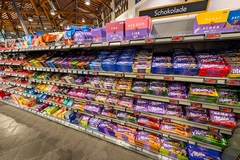
- Industry news
Industry news
- Category news
Category news
- Reports
- Key trends
- Multimedia
- Journal
- Events
- Suppliers
- Home
- Industry news
Industry news
- Category news
Category news
- Reports
- Key trends
- Multimedia
- Events
- Suppliers
dsm-firmenich launches next-generation Dairy Safe all-in-one cultures for cheese varieties

dsm-firmenich has expanded its Dairy Safe culture portfolio with four new rotations for semi-hard, hard, and continental-style cheese. The solutions are designed to support additive-free production while maintaining spoilage protection, consistent acidification, and flavor development.
The cultures combine acidification, bioprotection, and flavor functions in one solution. The company claims they are more phage robust (resistant to viruses) and temperature resistant than earlier versions, allowing use across a broader range of cheese types. The company has developed two flavors — buttery savory and sweet bouillon — for use with cow, goat, or sheep milk.
A key feature of the new rotations is the production of higher levels of nisin, a peptide effective against gram-positive bacteria such as Clostridia tyrobutyricum, Bacillus, and Staphylococcus species. This offers protection against defects such as late blowing, slits, and cracks. Unlike nitrate or lysozyme, nisin does not require additive labeling and avoids egg allergen declarations.

“These unique, all-in-one cultures enable cheesemakers to make award-winning semi-hard, hard, and continental cheese varieties without any additives such as lysozyme or nitrate,” Pim van Hee, global business director Cheese Cultures at dsm-firmenich, tells Food Ingredients First.
“This allows for labels free from additives, where only the cultures (and any other ingredients) need to be listed. These cultures give cheesemakers one single solution for acidification, bioprotection, and flavor development.”
“Spoilage can be devastating to cheesemakers — for quality and profitability. That’s why we set out to develop a new generation of all-in-one protective cultures that give cheese producers complete peace of mind that they are protecting their product, their brand, and profitability with a single label-friendly solution.”
Nisin in cheese production
dsm-firmenich’s Dairy Safe cultures contain both nisin-producing strains and nisin-immune strains. The new rotations have a higher concentration of nisin than any other solutions on the market, the company claims.
The nisin-producing and acidifying Lactococcus lactis strains prevent butyric acid fermentation and inactivate other gram-positive spoilage bacteria, such as Clostridia tyrobutyricum, which prevents late blowing and the formation of slits and cracks.
The nisin-immune starter culture strains are designed to ensure consistent acidification and taste with a similar performance to standard direct-to-vat starter cultures.
“Nisin prevents spoilage of gram-positive bacteria like Clostridia, Bacillus, and Staphylococcus species. It is also more effective against late blowing than nitrate, which has a breakthrough limit, and lysozyme, which needs to be labeled as an egg allergen,” Van Hee says.
“These new cultures are more phage robust and have greater temperature resistance than other generations that have come before. The cultures have been designed for consistent eye formation and two distinct taste directions. They are suitable for a wide range of semi-hard, hard, and continental cheese varieties, so cheesemakers looking for label-friendly assured bioprotection should get in touch to see which specific strains will be best for their processes.”










